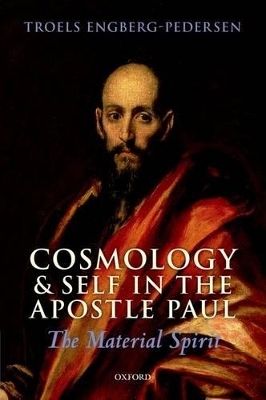
Cosmology and Self in the Apostle Paul
Oxford University Press (Verlag)
978-0-19-959674-4 (ISBN)
Cosmology and Self in the Apostle Paul challenges the traditional reading of Paul. Troels Engberg-Pedersen argues that the usual, mainly cognitive and metaphorical, ways of understanding central Pauline concepts, such as 'being in Christ', 'having God's pneuma (spirit), Christ's pneuma, and Christ himself in one', must be supplemented by a literal understanding that directly reflects Paul's cosmology.
Engberg-Pedersen shows that Paul's cosmology, not least his understanding of the pneuma, was a materialist, bodily one: the pneuma was a physical element that would at the resurrection act directly on the ordinary human bodies of believers and transform them into 'pneumatic bodies'. This literal understanding of the future events is then traced back to the Pauline present as Engberg-Pedersen considers how Paul conceived in bodily terms of a range of central themes like his own conversion, his mission, the believers' reception of the pneuma in baptism, and the way the apostle took the pneuma to inform his own and their ways of life from the beginning to the projected end.
In developing this picture of Paul's world view, an explicitly philosophically oriented form of interpretation ('philosophical exegesis') is employed, in which the interpreter applies categories of interpretation that make sense philosophically, whether in an ancient or a modern context. For this enterprise Engberg-Pedersen draws in particular on ancient Stoic materialist and monistic physics and cosmology - as opposed to the Platonic, immaterialist and dualistic categories that underlie traditional readings of Paul - and on modern ideas on 'religious experience', 'self', 'body' and 'practice' derived from Foucault and Bourdieu. In this way Paul is shown to have spelled out philosophically his Jewish, 'apocalyptic' world view, which remains a central feature of his thought.
The book states the cosmological case for the author's earlier 'ethical' reading of Paul in his prize-winning book, Paul and the Stoics (2000).
Born in 1948, Troels Engberg-Pedersen was educated in classics and philosophy (Copenhagen and Oxford). He has obtained two doctoral degrees, one in philosophy on Aristotle's Ethics (1983) and one in theology on Paul and Stoicism (2000). His fields of expertise cover the ancient world with a special focus on ancient philosophy and early Christianity. He has lectured widely in Europe and the United States. Since the early 1990's he has more or less continuously been involved in major specially funded research projects, including one on 'Philosophy at the Roots of Christianity' (2003-2007) and one on 'Naturalism and Christian Semantics' (2008-2013). He has published with major publishing houses and in the leading journals of his fields.
Introduction ; 1. A Stoic Understand of the Pneuma and Resurrection in 1 Corinthians 15 ; 2. The Bodily Pneuma in Paul ; 3. Physics, Cognition, and Superhuman Persons ; 4. Divine and Human Agency and Freedom ; 5. From Self to Shared ; 6. Bodily Practice ; Bibliography
| Erscheint lt. Verlag | 18.11.2010 |
|---|---|
| Verlagsort | Oxford |
| Sprache | englisch |
| Maße | 156 x 235 mm |
| Gewicht | 461 g |
| Themenwelt | Geisteswissenschaften ► Philosophie ► Philosophie Altertum / Antike |
| Religion / Theologie ► Christentum ► Kirchengeschichte | |
| ISBN-10 | 0-19-959674-3 / 0199596743 |
| ISBN-13 | 978-0-19-959674-4 / 9780199596744 |
| Zustand | Neuware |
| Haben Sie eine Frage zum Produkt? |
aus dem Bereich


